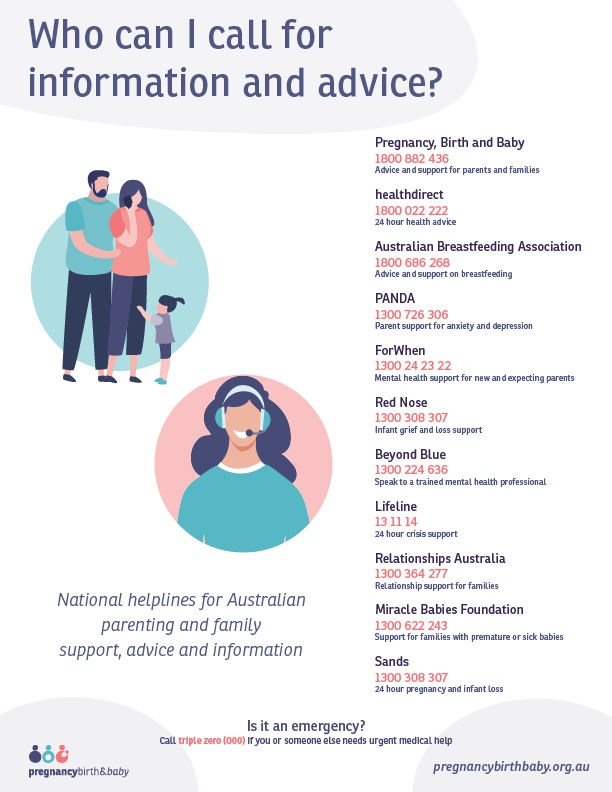Support for parents
4-minute read
Having a baby can be both exciting and overwhelming. Friends and family can offer a lot of advice, but most new parents will also need some outside support. Here are some trusted links to help you navigate the many services in Australia available to you.
How to find trusted advice
There is a lot of advice available for new parents. Often, well-meaning family and friends will tell you that what you’re feeling is normal. But you know if you need help.
If you don’t know what to do or you just don’t feel right, you should seek support. There is no need to feel ashamed or embarrassed.
Parents who often need extra support include very young parents, first-time parents, single parents, or parents whose families are far away. There are plenty of places where you can find advice, support and companionship in these circumstances.
The internet is a good place to find information. However, make sure you only follow advice that is based on evidence or expert opinion and is written by a credible organisation (like a university, government department or health institution). Advice on the internet is no substitute for advice from a healthcare professional.
Some trusted sources you can go to for advice and support include:
- Your GP or healthcare provider.
- Your local maternal and child health clinic: The services clinics provide vary from state to state, but they will generally offer free check-ups, specialist services and support. Your GP, library or state health department will advise you on how to find your local clinic.
- A mothers’ group: You may be assigned to a mothers' group by your hospital, through your antenatal classes or by the maternal and child health clinic. Or you can find a local support group through the Australian Breastfeeding Association.

Who can I call for information and advice?
National helplines for parenting and family information and support in Australia.
Visiting a website or calling a phone line
Pregnancy and parenting information and support
- Pregnancy, Birth and Baby: 1800 882 436 (free call), 7 days, and video call.
- Australian Breastfeeding Association: National Breastfeeding Helpline: 1800 MUM 2 MUM (or 1800 686 268), 24 hours / 7 days. Australia’s leading authority on breastfeeding.
- Red Nose: 1300 308 307, 24 hours / 7 days. Infant loss and grief support
- Miracle Babies Foundation: 1300 622 243, 24 hours / 7 days. Family support helpline for premature and sick babies.
- Karitane Careline: 1300 227 464. Education and support.
- Tresillian Parent Helpline: 1300 272 736 (1300 2Parent), 7 days, From 7am.
- Services Australia
Mental health and relationship advice and support
- Perinatal Anxiety & Depression Australia (PANDA): 1300 726 306, Mon to Fri, 9am - 7:30pm AEST. Support for post and antenatal depression and anxiety.
- ForWhen: 1300 24 23 22 (Monday to Friday, 9.00am to 4.30pm). Mental health support for expecting and new parents.
- Gidget Foundation: online and telehealth perinatal depression and anxiety support — 1300 851 758
- Lifeline: 13 11 14, 24 hours / 7 days. Crisis support and suicide prevention.
- MensLine: 1300 78 99 78, 24 hours / 7 days. Telephone and online support for men.
- Relationships Australia: 1300 364 277. Relationship support services.
State and territory parenting lines
- Parentline ACT: (02) 6287 3833, 9am - 5pm AEST.
- Parent Line NSW: 1300 1300 52, Mon to Fri, 9am - 9pm / weekends, 4pm - 9pm.
- Parentline Queensland and Northern Territory: 1300 30 1300, 7 days, 8am - 10pm.
- Parent Helpline South Australia: 1300 364 100, 7 days, 7.15am - 9.15pm.
- Parent Line Tasmania: 1300 808 178, 24 hours / 7 days.
- Parentline Victoria: 13 22 89, 7 days, 8am - 12am.
- Ngala Parenting Line WA: (08) 9368 9368 (metro) or 1800 111 546 (Regional), 7 days, 8am - 8pm.

Speak to a maternal child health nurse
Call Pregnancy, Birth and Baby to speak to a maternal child health nurse on 1800 882 436 or video call. Available 7am to midnight (AET), 7 days a week.
Learn more here about the development and quality assurance of healthdirect content.
Last reviewed: September 2023


